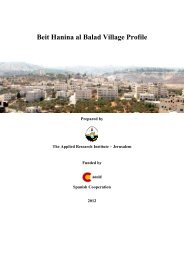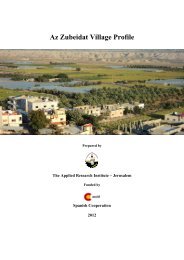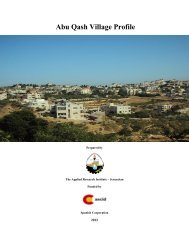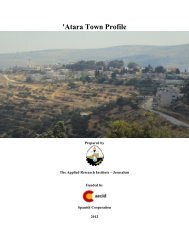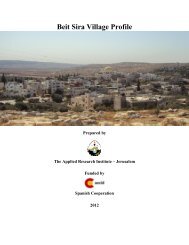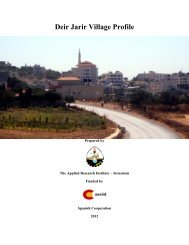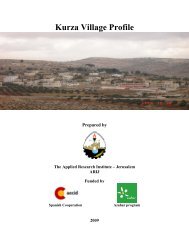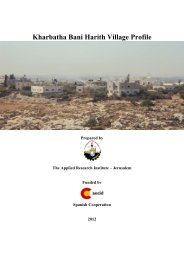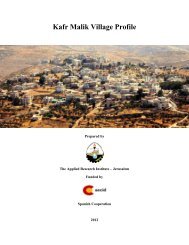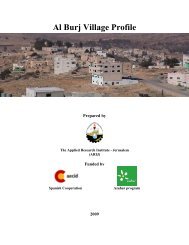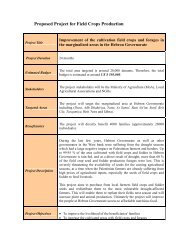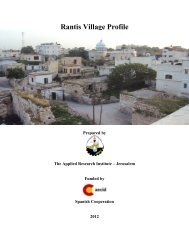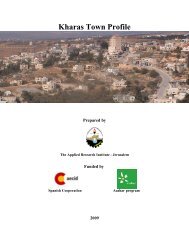4. Field Crops Production and Improvement.pdf
4. Field Crops Production and Improvement.pdf
4. Field Crops Production and Improvement.pdf
You also want an ePaper? Increase the reach of your titles
YUMPU automatically turns print PDFs into web optimized ePapers that Google loves.
<strong>Field</strong> <strong>Crops</strong> <strong>Production</strong> <strong>and</strong> <strong>Improvement</strong><br />
Project Title<br />
<strong>Improvement</strong> of the cultivation field crops <strong>and</strong> forages in the marginalized<br />
areas in the Bethlehem Governorate<br />
Project<br />
Duration<br />
24 months<br />
Estimated<br />
Budget<br />
The total area targeted is around 6000 dunums, Therefore, the total budget is<br />
estimated at around US $807,500<br />
The farmers will contribute with 20 percent of the seeds costs <strong>and</strong> the<br />
cooperatives will contribute with 25 percent of the required agricultural<br />
equipments.<br />
Stakeholders<br />
The project stakeholders will be the Ministry of Agriculture (MoA), Local<br />
Agricultural Associations <strong>and</strong> NGOs.<br />
Targeted<br />
Areas<br />
The project will target the marginalized area at the Bethlehem Governorate<br />
including: Za’tara, Ash Shawawra, Dar Salah, Al ‘Ubeidiya, Jannatah, Tuqu’,<br />
Beit Fajjar, Marah Rabah, Beit Sakariya, Kisan, Jubbet adh Dhib, ‘Arab ar<br />
Rashayida, Al Khader, Al Ma’sara, Khallet al Haddad, Al Khas & An Nu’man ,<br />
Beit Sahour <strong>and</strong> Beit Ta’mir.
Map<br />
Targeted<br />
Areas<br />
of<br />
Beneficiaries<br />
The project will directly benefit 1200 families (approximately 7,800 individuals).<br />
Project<br />
Description<br />
During the last few years, the Bethlehem Governorate as well as other<br />
Governorates in the West Bank was suffering from the drought seasons which<br />
had a large negative impact on Palestinian farmers <strong>and</strong> herders. Up to 99.8% of<br />
the area cultivated with field crops <strong>and</strong> fodder in the Bethlehem Governorate is<br />
rain fed. As a direct result of dry conditions in the south-eastern West Bank, up to<br />
50% of the field crop seeds <strong>and</strong> fodder production forages were lost this year.<br />
This is severely threatening the availability of seeds for the coming agricultural<br />
seasons, at a time when the Palestinian farmers are already suffering from high<br />
prices of agricultural inputs, especially the seeds of field crops <strong>and</strong> fodder to feed<br />
livestock <strong>and</strong> the shortage in the availability of local adapted verities.<br />
This project aims to purchase from local farmers (agricultural cooperatives) field<br />
crops <strong>and</strong> fodder seeds of the local drought resistant varieties <strong>and</strong> redistribute<br />
them to the most vulnerable drought-affected farmers. This will enable them to<br />
replant their fields next season, increase the size of cultivated areas, increase<br />
plant production <strong>and</strong> provide more feed to increase the animal production.<br />
Ultimately, the project will improve the people in the Bethlehem Governorate’s,<br />
access to affordable nutritious food <strong>and</strong> it will assist in reducing food prices.<br />
Project<br />
Objectives<br />
<br />
<br />
To improve the livelihood of the beneficiaries' families.<br />
To increase the cultivated areas with field crops <strong>and</strong> forages.
To increase the produced amounts of food grains <strong>and</strong> legumes.<br />
To improve animal feed production <strong>and</strong> forage.<br />
To improve the productivity of livestock (red meat <strong>and</strong> milk production).<br />
To decrease the cost of plant production.<br />
To reduce the effect of drought.<br />
To decrease the l<strong>and</strong> degradation <strong>and</strong> soil erosion of the marginalized<br />
areas.<br />
To create jobs for the poorest families.<br />
Project<br />
Activities<br />
<br />
<br />
<br />
<br />
<br />
<br />
<br />
Assist 1200 of the most vulnerable drought-affected farmers in planting<br />
6000 dunums with suitable local varieties of wheat, barley, common vetch,<br />
better vetch <strong>and</strong> chickpeas.<br />
Providing vital <strong>and</strong> timely extension services to beneficiary households,<br />
with the assistance of MoA.<br />
Establish a participatory mechanism for project activities (seed purchase,<br />
farmers’ selection, seed distribution <strong>and</strong> monitoring) through creating<br />
project community committees in the targeted areas. Also, coordinating<br />
with the existing active agricultural cooperatives to create a sustainable<br />
seed production <strong>and</strong> a distribution system.<br />
Improving the capacities of 8 active agricultural cooperatives in the seed<br />
management <strong>and</strong> improving the farmers’ coordination <strong>and</strong> collective<br />
purchasing <strong>and</strong> selling systems, as well as creating a food security system.<br />
Providing the created social seed bank (with the participation of the<br />
targeted 8 cooperatives) with the required equipments, machinery, <strong>and</strong><br />
facilities.<br />
Building farmers’ knowledge in crop management, seed storage <strong>and</strong><br />
Integrated Pest Management as well as cooperation.<br />
Improve Farmer cooperation.<br />
Expected<br />
Results<br />
<br />
<br />
<br />
<br />
<br />
<br />
<br />
Increased income <strong>and</strong> production of beneficiary farmers.<br />
540 metric tons of wheat, barley, lentils <strong>and</strong> common <strong>and</strong> bitter vetch seeds<br />
produced.<br />
1500 tons of green fodder <strong>and</strong> dry hay produced.<br />
500 men <strong>and</strong> women farmers linked with effective cooperatives.<br />
A social seed bank created <strong>and</strong> provided with suitable equipments,<br />
machineries’ <strong>and</strong> facilities.<br />
Capacity built of 8 agricultural cooperatives in developing <strong>and</strong> managing<br />
the social seed bank <strong>and</strong> the cooperative system management.<br />
Capacity built of 1200 farmers in crop <strong>and</strong> pest management, seed storage<br />
<strong>and</strong> coordination.



